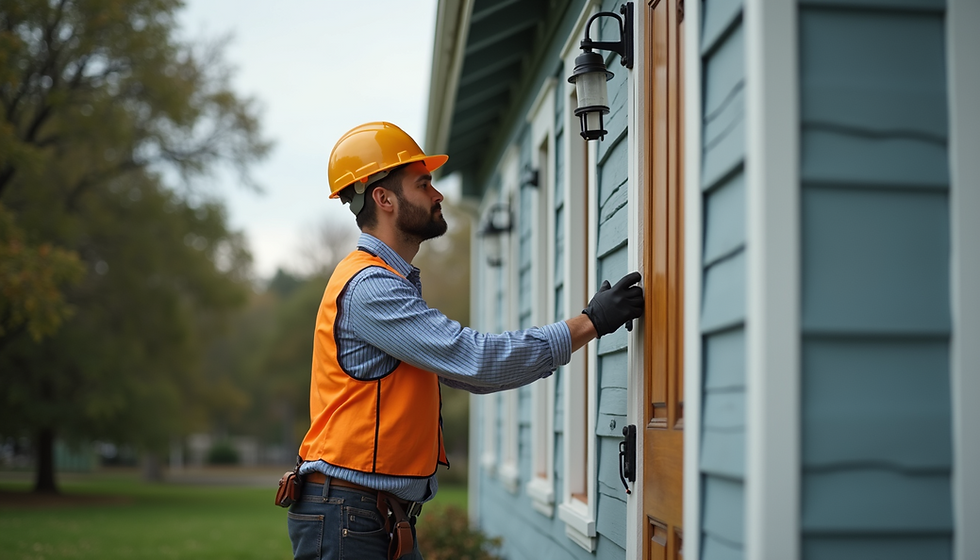Understanding the Role of a Home Inspection Professional
- David Lee
- Apr 28, 2025
- 4 min read
Buying a home is one of the most significant investments many people will make in their lifetime. Yet, it can also be one of the most stressful experiences. This is where the home inspection professional comes in. Their expertise can mean the difference between a dream home and a financial nightmare. In this blog post, we will explore what a home inspection is, the steps a home inspector follows, and why their role is crucial for potential homeowners.
What is a Home Inspection?
A home inspection is a visual examination of a property’s structure and systems. This process helps buyers understand the condition of the home they wish to purchase. A licensed home inspector assesses various components, including:
Plumbing
Electrical systems
Heating and cooling systems
Roofs and attics
Walls, floors, and ceilings
The goal is to identify any issues that may require repair or replacement before the purchase is finalized. The findings from the inspection can also be a valuable negotiation tool for the buyer.

Why is Home Inspection Important?
A proper home inspection can uncover serious issues that could lead to costly repairs in the future. According to the American Society of Home Inspectors, nearly 80% of all home inspections uncover at least one major problem. This statistic underscores the importance of understanding what you're getting into before closing on a sale.
When buyers receive a detailed report from the home inspector, they can:
Make informed decisions about the purchase
Negotiate repairs or adjustments to the sale price
Budget for necessary future upgrades
Home inspections ensure transparency in the buying process, providing peace of mind for buyers.

How Long Does It Take to Become a Home Inspector in NJ?
In New Jersey, aspiring home inspectors must complete specific educational and training requirements before they can start their careers. The timeline can vary, but here’s an overview of what you might expect:
Education: Most states, including New Jersey, require completion of a training program that can range from a few weeks to several months. These programs cover essential topics, including building codes, inspection processes, and report writing.
Experience: After educational training, candidates often need to complete an apprenticeship or gain practical experience under a licensed inspector. This experience can take several months depending on how immersed the individual is in the field.
Licensing: Finally, candidates must pass a state examination to become licensed. Preparation for this exam can take additional time, especially for those juggling other commitments.
Overall, you can expect the process to take anywhere from six months to a year to complete.

The Home Inspection Process
Understanding the step-by-step process of a home inspection can provide insight into its significance. A typical home inspection might look like this:
Schedule the Inspection: Once a purchasing agreement is in place, buyers typically schedule the home inspection. It is often advisable to do this as soon as the agreement is signed to allow time for negotiations based on the findings.
Conduct the Inspection: On the day of the inspection, the home inspector will meet with the buyer to walk through the property. They will examine each area, checking for visible issues and signs of wear.
Documentation: After the inspection, the inspector compiles a detailed report that summarizes their findings. This documentation often includes photos, notes, and recommendations for repairs or further evaluations.
Follow-Up: Buyers can then use this report to discuss potential repairs or renegotiation with the seller.
The entire process typically takes about two to three hours, but the benefits extend far beyond the time spent.
What Should You Look for in a Home Inspector?
Choosing a qualified home inspector is critical. Here are essential factors to consider:
Certification and Licensing: Ensure that your home inspector is certified and licensed in your state. Check their credentials and verify them with the relevant authorities.
Experience: Ask about their experience level and how many inspections they have conducted. A more experienced inspector may be better at identifying subtle issues.
Sample Reports: Request to see a sample inspection report. This will give you insight into how thorough they are in documenting their findings.
Insurance: A reputable home inspector should carry liability insurance. This protects both the inspector and the client in the event of negligence or oversight.
By focusing on these areas, buyers can significantly enhance their chances of hiring a competent and trustworthy inspector.
Final Thoughts
The role of a home inspection professional is vital in the real estate process. A thorough inspection can save buyers from unexpected repair costs and potential disasters down the road. It is crucial to research and select the right home inspector, as this decision can profoundly impact your home buying experience.
If you’re in the market for a home, consider reaching out to a certified home inspector to ensure you’re making a well-informed investment. The peace of mind that comes with knowing your potential new home is in good condition is invaluable.









Comments